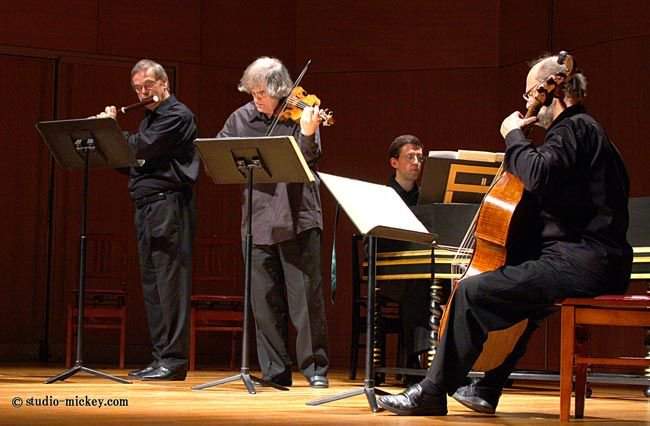
As Oscar Wilde once wrote, "After a good dinner one can forgive anybody, even one's own relations." Family can be the source of both our greatest joys and our deepest frustrations. This hour on Harmonia, we explore music by and for families. Our featured release is the 2017 recording Fanfare and Filigree, the debut album from East-coast based ensemble Kleine Kammermusik.
We heard a canzona by Giovanni Gabrieli. It was performed by Les Sacqueboutiers de Toulouse.
Gabrieli & Gabrieli
Back in the Renaissance era, professions often ran in families, and musicians were no exception. Giovanni Gabrieli was a member of one of those musical families. He was very close to his uncle, Andrea, even studying with him for a while. Andrea Gabrieli provided his nephew Giovanni with important professional connections, and both men studied with Orlande de Lassus. Let's hear the Gloria from the Missa Vexillia Regis by the elder Gabrieli.
We heard music by Andrea Gabrieli, performed by I Cantori di San Marco, directed by Marco Gemmani.
Giovanni Gabrieli succeeded his uncle Andrea as principal composer of ceremonial music at St. Mark's Basilica in Venice. In the dedication to his 1587 book of concerti, he described himself as "little less than a son" to Andrea. After Andrea's death, Giovanni preserved his uncle's legacy by compiling and publishing volumes of his works.
Let's hear Giovanni Gabrieli's Sonata piano e forte from his Symphoniae Sacrae, composed in 1597.
We heard Giovanni Gabrieli's Sonata piano e forte, performed by Les Sacqueboutiers de Toulouse.
Like Father, Like Son
It is not clear whether Daniel Purcell was the brother or the cousin of his more famous relative, Henry Purcell. Like Henry, Daniel spent much of his life in London, writing largely for the theater. Let's hear some music by the Purcells. First up, Daniel's "Who can beat ye pangs of despair?" After that, we'll hear Henry's "Queen's Epicedium," both performed by soprano Delia Agúndez. Can you hear the family resemblance?
That was soprano Delia Agúndez, performing Henry Purcell's "Queen's Epicedium." Before that, we heard Daniel Purcell's "Who can beat ye pangs of despair?"
All in the Family
Welcome back. We've been exploring the vein of musical talent that sometimes runs in families. As it turns out, keeping it "all in the family" wasn't just something that happened back in the Renaissance. We have a number of examples of famous musical families still with us today. One example is the Kuijkens, a Belgian family of musicians, many of whom have had important careers as performers, conductors, and pedagogues.
Conductor Sigiswald Kuijken, born in 1944, is the founder and director of the Belgium-based Baroque ensemble La Petite Band. Here is the final movement from that ensemble's recording of Vivaldi's Flute Concerto in D Major, featuring brothers Sigiswald, the conductor, and Barthold, as the flute soloist.
Barthold Kuijken was the featured soloist in that recording, directed by his brother Sigiswald, of the final movement of Vivaldi's Flute Concerto in D Major.
The Kuijken brothers - Wieland, born in 1938, Sigiswald, born in 1944, and Barthold, born in 1949 - are well-known as pioneers in the field of recording early music. Collectively, they have recorded music from Simpson to Debussy on period instruments, and in ensembles ranging from large orchestras to intimate viol consorts. Let's listen to gamba soloists Wieland Kuijken and Mieneke van der Velden with theorbist Fred Jacobs, performing music of Marin Marias from his Pièces de viole.
We heard the chaconne from Marin Marais's Suite in G Major for 2 Viols & Continuo, performed by Wieland Kuijken and Mieneke van der Velden with theorbist Fred Jacobs.
Fanfare and Filigree
East-coast based ensemble Kleine Kammermusik enjoys bringing both well-loved and lesser-known chamber works to audiences. On their debut recording, Fanfare and Filigree, the ensemble features chamber works from Dresden and Paris.
Louis-Antoine Dornel served as an organist and composer at the abbey of Saint Geneviève. His trio sonatas invite performers to explore a variety of options for scoring. We'll hear some of "La Triomphante" from his Sonates en trio performed on oboes, bassoon, and cello.
We heard movements of "La Triomphante" from Louis-Antoine Dornel's Sonates en trio. The ensemble Kleine Kammermusik, from their 2017 debut recording Fanfare and Filigree.
Though he may not be a household name among most classical music lovers, Jan Dimas Zelenka is definitely a household name for period double-reed players. Zelenka lived and worked mostly in Dresden. His six sonatas for two oboes, bassoon, and continuo are a constant source of both inspiration and exasperation for performers. Let's hear the final movement of his Sonata No. 1 in F Major.
The allegro assai from Zelenka's Sonata No. 1 in F Major for two oboes, bassoon, and basso continuo. That track came from our featured release, Kleine Kammermusik's 2017 recording Fanfare and Filigree: Chamber Music from Paris and Dresden.Â
Break and theme music
:30, Marin Marais: Dialogues, Mieneke van der Velden & Wieland Kuijken, Ramee 2016, Tr. 5 Pièces de viole, Book 1, Suite in D Minor for 2 Viols & Continuo: V. Gigue
:60, Fanfare and Filigree: Chamber Music from Dresden and Paris, Kleine Kammermusik, Acis 2017, Tr. 18 Huitiéme Concert (Les Gouts Réunis): Air AniméÂ
:30, Vivaldi: Flute Concertos, La Petite Band, Accent 2011, Tr. 27 Concerto for 2 Flutes in C Major, RV 533: III. Allegro
Theme:Â Danse Royale, Ensemble Alcatraz, Elektra Nonesuch 79240-2 1992 B000005J0B, Tr. 12 La Prime Estampie Royal
The writers for this edition of Harmonia was Sarah Huebsch.
Learn more about recent early music CDs on the Harmonia Early Music Podcast. You can subscribe on iTunes or at http://www.harmoniaearlymusic.org.









